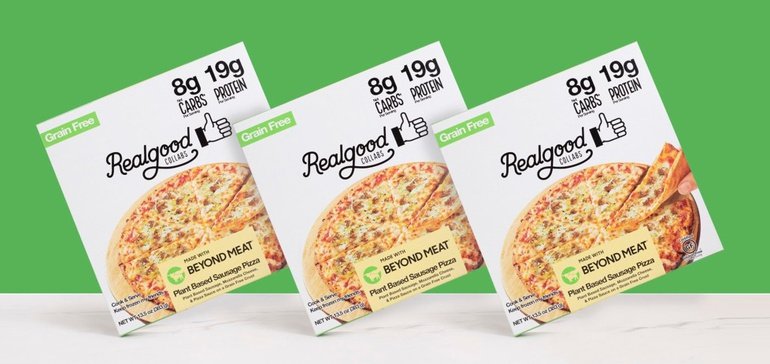Real Good Foods files for $86.25M IPO

Dive Brief:
- The Real Good Foods Company, a manufacturer of grain-free and better-for-you frozen entrees, plans to go public, according to documents filed Tuesday evening with the U.S. Securities and Exchange Commission. The company plans to raise $86.25 million in its IPO, after having initially filed a confidential registry statement in July.
- The company, founded in 2016 with the mission of making comfort foods that consumers can feel good about eating, touted its products’ wide appeal and nutritional qualities in its filing. Its products are currently in 170,000 total distribution points nationwide, including Walmart, Kroger and Costco. The company generated nearly $39 million in sales in 2020, and $35.5 million in the first six months of 2021, according to the filing.
- The Real Good Food Company is the latest in a long parade of food and beverage companies making their IPO this year, including Oatly, Zevia, Dole and Sovos Brands. Vita Coco is slated to begin trading next week, and Chobani confidentially filed a registry statement in July.
Dive Insight:
The Real Good Food Company was founded five years ago to create better-for-you and gluten-free versions of frozen comfort foods. The company’s products, branded as “Realgood,” include gluten-free pizzas, enchiladas, breakfast sandwiches, and entrees such as lasagna and stuffed chicken. The brand has been popular among people with diabetes searching for low-carb offerings, and it fits into the gluten-free food niche.
Real Good Foods has lately seen a great deal of growth. According to the filing, the company increased its retail distribution by 80% in the two years ending Dec. 27, 2020. Sales have also skyrocketed, with the dollar amount in the first half of this year adding up to almost twice the sales of first six months of 2020. Last week, the company announced a new pizza featuring plant-based Beyond Sausage. Earlier this year, the company launched its Grande Enchilada product, which uses chicken and cheese to make a grain-free tortilla.
In 2019, Real Good Foods received a minority investment from Strand Equity for an undisclosed amount. It received $35 million in May through a debt investment.
The company has never made a profit, and has posted pretty significant losses since its inception, according to the filing. Last year, the company’s net loss was about $15.6 million. In the first six months of 2021, the net loss has been $10.3 million. Real Good Foods plans to use the funds raised by the IPO to further expand capacity and distribution, which is something it acknowledges in its filing will be expensive and may keep the company from being profitable in the foreseeable future.
The filing talks a lot about Real Good Foods’ potential. The frozen food space saw $58 billion in U.S. sales last year, according to SPINS data cited in the filing. During the last two years, the frozen segment has had a compound annual growth rate of 11%. Health and wellness brands, like Real Good Foods, made up 16% of frozen food, the company says in its filing, meaning there is a lot of runway for growth. The company also talks about distribution points in its filing, but there are many more actual stores it could get into. In a recent press release, the company said its products were in more than 16,000 stores nationwide.
Real Good Foods also brings up its online fan base in the filing, which it describes as “one of the largest social media followings of any brand within the frozen food category today.” About 500,000 accounts follow the company on various social platforms. From its earliest days, Real Good Foods has seen its online fan base as a significant asset. In 2018, CEO Bryan Freeman told Food Navigator that the brand’s success in e-commerce had a lot to do with social media, which it used as a tool to gauge what consumers were interested in and listen directly to their concerns.
But potential for future earnings doesn’t add up to sales, and even the most engaged social media followers are not the same as investors. The brand has grown quickly, but exponential growth rates are easier to post when a company is small. While Real Good Foods may have all of the right ingredients for growth, what it needs for a successful IPO are people who are willing to put their money into the company’s future success.
Source: fooddive.com

